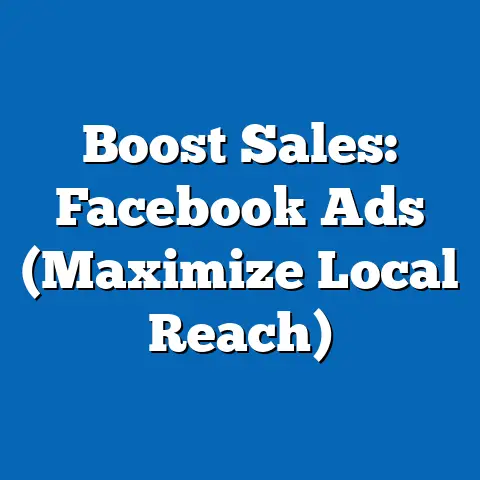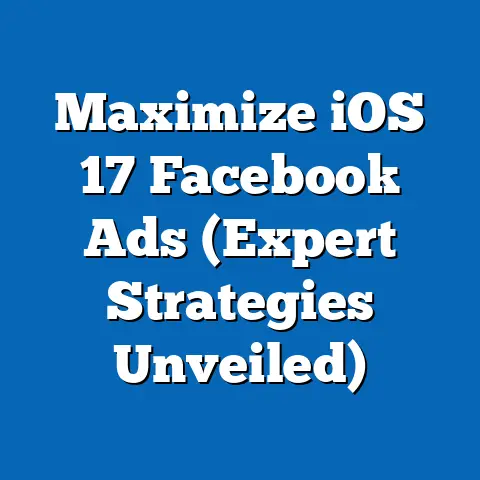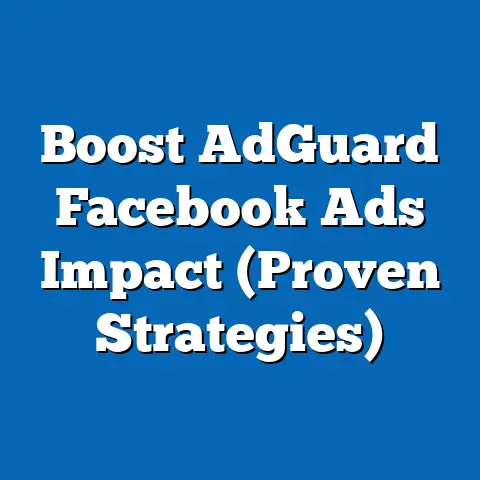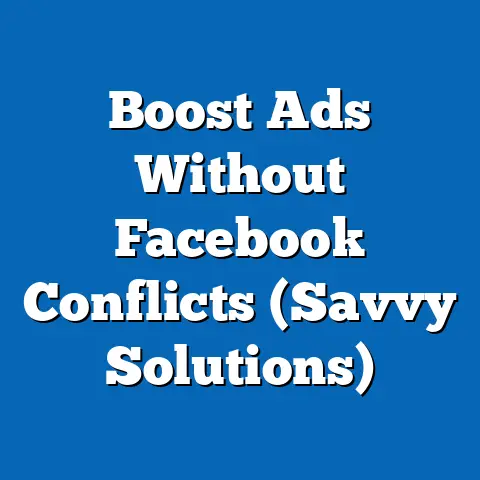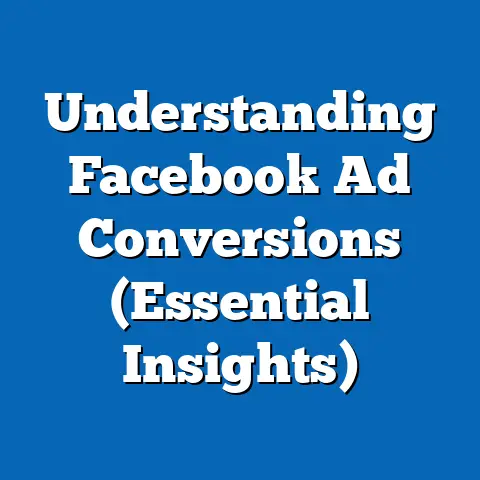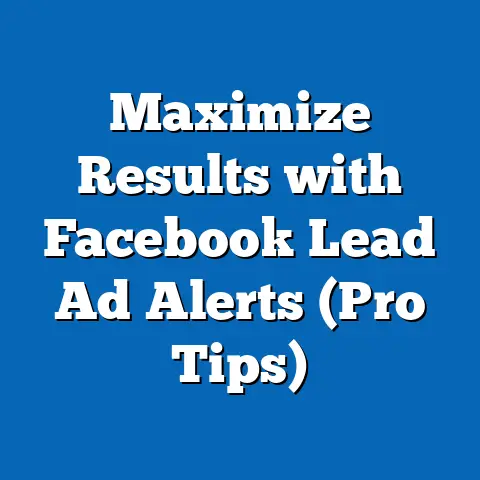Navigate Facebook’s Lead Gen Rules (Expert Compliance Guide)
Navigating the world of Facebook advertising can feel like navigating a minefield, especially when it comes to lead generation.
I remember when I first started running lead gen campaigns; I was so focused on getting those leads that I barely glanced at the fine print.
It wasn’t long before I got a few ads disapproved, and let me tell you, that’s a wake-up call!
Since then, I’ve made it my mission to understand Facebook’s lead generation rules inside and out.
This guide is designed to be your expert companion in this journey.
It’s not just about avoiding ad disapprovals; it’s about building a sustainable, ethical, and highly effective lead generation strategy that benefits both your business and your audience.
We’ll break down the rules, explore best practices, and provide actionable steps to ensure your campaigns are compliant and successful.
Understanding Facebook’s Lead Generation Objectives
What is Lead Generation on Facebook?
Lead generation on Facebook is the process of collecting potential customer information directly through the platform.
Instead of sending users to an external landing page, Facebook allows you to capture leads within its environment.
This can be done through various ad formats, such as Lead Ads and Instant Forms.
Why Lead Generation Matters
For businesses, lead generation is the lifeline of growth.
It’s the process of attracting and converting strangers into prospects who are interested in your products or services.
Facebook, with its massive user base and sophisticated targeting capabilities, is a goldmine for lead generation.
Think about it: where else can you reach such a diverse audience with such precision?
Whether you’re a local bakery looking to build an email list or a national SaaS company targeting enterprise clients, Facebook offers the tools to connect with your ideal customers.
Types of Lead Generation Ads on Facebook
Facebook offers several types of lead generation ads, each with its own unique benefits:
- Lead Ads: These ads allow users to submit their information directly within the Facebook app.
They’re mobile-optimized and pre-filled with user data, making it incredibly easy for people to sign up. - Instant Forms: These are forms that appear directly within the Facebook app when a user clicks on your ad.
They’re customizable and can be used to collect a wide range of information, from basic contact details to more detailed survey responses.
Facebook’s Mission and Lead Generation Rules
Facebook’s mission is to give people the power to build community and bring the world closer together.
This mission extends to its advertising policies, which are designed to create a safe and trustworthy environment for users.
The lead generation rules are shaped by Facebook’s commitment to user privacy, transparency, and security.
They’re designed to prevent deceptive practices, protect user data, and ensure that people have a positive experience on the platform.
Key Takeaway: Understanding Facebook’s lead generation objectives and the different ad formats available is the foundation for building a successful and compliant strategy.
Overview of Facebook’s Advertising Policies
The Core of Facebook’s Advertising Policies
Facebook’s advertising policies are the backbone of its ad ecosystem.
They’re a comprehensive set of guidelines that govern what you can and cannot advertise on the platform.
These policies are designed to protect users, prevent harmful content, and ensure a fair and transparent advertising environment.
Policies Directly Affecting Lead Generation Ads
Several policies directly impact lead generation ads, including:
- Prohibited Content: This includes ads that promote illegal products or services, discriminatory practices, or misleading information.
- Personal Attributes: You cannot target users based on their personal attributes, such as race, ethnicity, religion, or sexual orientation.
- Health and Medical Content: Ads related to health and medical topics are subject to strict regulations, including the requirement for disclaimers and accurate information.
- Data Collection and Use: You must be transparent about how you collect and use user data, and you must comply with all applicable privacy laws.
Checklist of Key Policies
Here’s a quick checklist of key policies to keep in mind when creating lead generation ads:
- Accuracy: Ensure that all information in your ads is accurate and truthful.
- Relevance: Your ads should be relevant to the interests of your target audience.
- Transparency: Be clear about what users are signing up for and how their data will be used.
- Compliance: Comply with all applicable laws and regulations, including privacy laws.
Common Pitfalls
One of the most common pitfalls I see is businesses failing to provide clear and conspicuous disclosures about how they will use the data they collect.
For example, if you plan to add leads to your email list, you must clearly state this in your ad copy and privacy policy.
Another frequent mistake is using misleading or deceptive language to entice users to sign up.
Key Takeaway: A thorough understanding of Facebook’s advertising policies is essential for avoiding ad disapprovals and building a compliant lead generation strategy.
Key Compliance Requirements for Lead Generation Ads
Legal Requirements for Collecting Leads
Collecting leads isn’t just about getting names and email addresses; it’s about adhering to legal requirements that protect user privacy and data rights.
The two most prominent laws in this area are the General Data Protection Regulation (GDPR) and the California Consumer Privacy Act (CCPA).
- GDPR: This European Union law applies to any business that collects data from EU residents, regardless of where the business is located.
It requires businesses to obtain explicit consent from users before collecting their data, and it gives users the right to access, rectify, and erase their data. - CCPA: This California law gives California residents the right to know what personal information is collected about them, to request deletion of their personal information, and to opt-out of the sale of their personal information.
The Importance of Transparency
Transparency is not just a legal requirement; it’s a cornerstone of ethical marketing.
You must be upfront about what users are signing up for and how their data will be used.
This means providing clear and conspicuous disclosures in your ad copy, privacy policy, and Instant Forms.
Providing Accurate and Truthful Information
Accuracy and truthfulness are non-negotiable.
Your ads must accurately represent your products or services, and you must not make any false or misleading claims.
This includes providing accurate disclaimers when applicable, such as when advertising health or financial products.
Data Security Measures
Protecting lead information is a critical responsibility.
You must implement robust data security measures to prevent unauthorized access, use, or disclosure of user data.
This includes using encryption, firewalls, and other security technologies.
Case Studies in Compliance
Let’s look at some examples of businesses that have successfully navigated these compliance requirements:
- Example 1: A SaaS Company: This company implemented a double opt-in process for its email list, requiring users to confirm their subscription before receiving any emails.
This ensured that all subscribers had given explicit consent to be added to the list. - Example 2: An E-commerce Store: This store provided a clear and concise privacy policy on its website, explaining how it collected, used, and protected user data.
It also gave users the option to opt-out of data collection and to request deletion of their data.
Key Takeaway: Compliance with legal requirements, transparency, accuracy, and data security are essential for building a sustainable and ethical lead generation strategy.
Crafting Compliant Lead Generation Ads
Creating Compliant Ads
Now that we’ve covered the legal and ethical requirements, let’s dive into the practical aspects of crafting compliant lead generation ads.
Best Practices for Ad Copy
Your ad copy is your first point of contact with potential leads, so it’s crucial to get it right.
Here are some best practices to keep in mind:
- Be Clear and Concise: Use simple language and avoid jargon.
- Highlight the Benefits: Focus on the value that users will receive by signing up.
- Include a Call to Action: Tell users exactly what you want them to do.
- Provide Disclosures: Be transparent about how you will use their data.
The Importance of Visual Elements
Visual elements play a crucial role in attracting attention and conveying your message.
Your images and videos should be relevant to your offer and should align with the content of your ad.
Avoid using misleading or deceptive visuals.
Setting Up Instant Forms
Instant Forms are a powerful tool for collecting leads directly within Facebook.
Here’s how to set them up for compliance:
- Include a Privacy Policy Link: Provide a link to your privacy policy so users can understand how their data will be used.
- Add a Custom Disclaimer: Include a custom disclaimer that explains what users are signing up for and how you will use their data.
- Use Checkboxes for Consent: Use checkboxes to obtain explicit consent from users before collecting their data.
Examples of Compliant Ads
Here are some examples of compliant lead generation ads for various industries:
- Real Estate: An ad for a real estate company offering a free home valuation.
The ad copy clearly states that users will be contacted by a real estate agent and includes a link to the company’s privacy policy. - Financial Services: An ad for a financial advisor offering a free consultation.
The ad copy includes a disclaimer that the consultation is for informational purposes only and does not constitute financial advice. - Health and Wellness: An ad for a gym offering a free trial.
The ad copy includes a disclaimer that the trial is subject to certain terms and conditions.
Key Takeaway: Crafting compliant lead generation ads requires attention to detail and a commitment to transparency and accuracy.
Monitoring and Reporting Compliance
Ongoing Monitoring
Compliance is not a one-time effort; it’s an ongoing process.
You must continuously monitor your ad performance and compliance to ensure that you’re meeting Facebook’s standards and legal requirements.
Using Facebook’s Ad Manager
Facebook’s Ad Manager provides a wealth of data and tools for tracking compliance metrics.
You can use it to monitor ad performance, identify potential issues, and generate reports.
Handling Ad Disapprovals
Ad disapprovals are a common occurrence, but they don’t have to be a setback.
If your ad is disapproved, take the time to understand why and make the necessary changes.
You can also appeal the decision if you believe it was made in error.
Maintaining Compliance Over Time
Facebook’s policies and legal requirements are constantly evolving, so it’s crucial to stay informed and adapt your strategies accordingly.
Subscribe to industry newsletters, attend webinars, and regularly review Facebook’s advertising policies.
Key Takeaway: Monitoring and reporting compliance is an ongoing process that requires vigilance and adaptability.
The Future of Lead Generation on Facebook
Potential Changes to Facebook’s Rules
The future of lead generation on Facebook is likely to be shaped by several factors, including evolving privacy regulations, increasing user expectations for transparency, and advancements in artificial intelligence.
Ethical Marketing Practices
Ethical marketing practices are becoming increasingly important, and they align perfectly with Facebook’s evolving policies.
By prioritizing transparency, accuracy, and user privacy, you can build trust with your audience and create a sustainable lead generation strategy.
Staying Informed
Staying informed is the key to success in the ever-changing world of digital marketing.
Subscribe to industry newsletters, attend webinars, and regularly review Facebook’s advertising policies to stay ahead of the curve.
Key Takeaway: The future of lead generation on Facebook will be shaped by evolving regulations, increasing user expectations, and the importance of ethical marketing practices.
Conclusion
Navigating Facebook’s lead generation rules may seem daunting, but it’s not only possible but also essential for building a successful and sustainable lead generation strategy.
By understanding the rules, prioritizing transparency, and implementing best practices, you can create campaigns that are both compliant and effective.
Remember, building trust with your audience is the foundation of any successful marketing strategy.
By being ethical, transparent, and respectful of user privacy, you can foster a positive experience for both your business and your audience.
So, take the time to understand the rules, stay informed about updates, and prioritize ethical marketing practices.
With the right knowledge and approach, you can navigate Facebook’s lead generation rules with confidence and achieve your lead generation goals.

